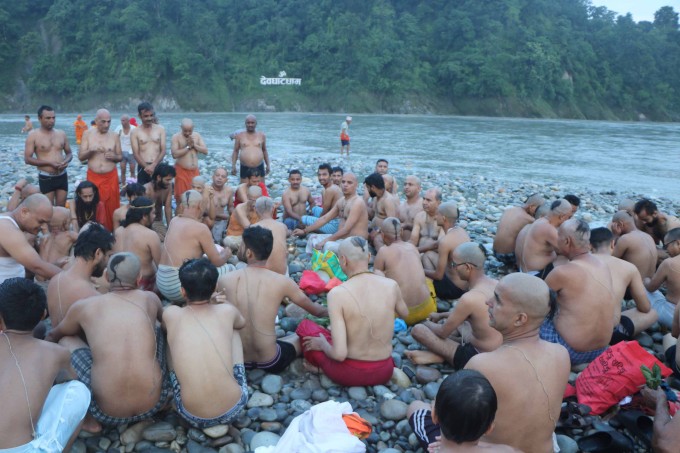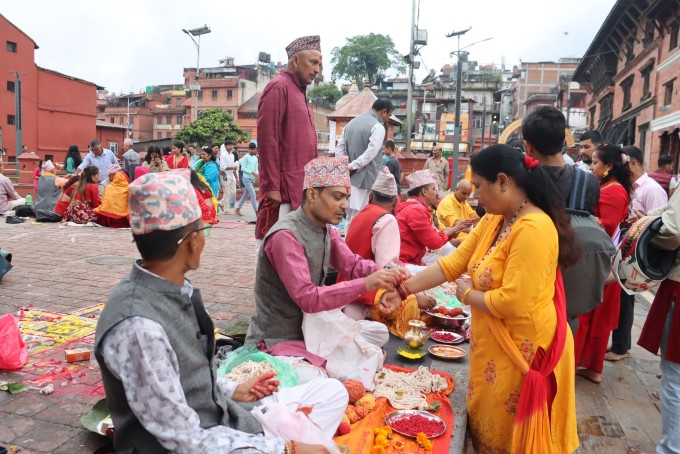Teej, a Hindu festival celebrated by women in Nepal (and many other parts of India), lasts three days: the first day is filled with feasting, the second day of rigid fasting, and the third day, known as Rishi Panchami, of a holy bath.
With the pandemic raging for the last two years, people are overjoyed this year and have already begun to gather with friends and family to celebrate. To make Teej even more special, NepalNews brings you some delectable recipes.
Bedmi Puri; Crispy black gram puri
Bedmi puri, the quintessential Indian lunch, breakfast, or brunch, never fails to satisfy a foodie's soul. It is just what you need to round out that delicious lunch spread. There are two ways to make bedmi puri: one with pithi added to the dough and one with pithi cooked and stuffed into puri.
Ingredients Required
Recipe
Step 1: Preparation of Dough
1. With 2 tbsp water, grind black gram into a coarse paste.
2. In a nonstick pan, heat 2 tbsp oil. Sauté for 30 seconds with asafoetida. Sauté for 2-3 minutes after adding the black gram paste.
3. Mix in the ginger-green chili paste, chilli powder, coriander powder, cumin powder, fennel powder, garam masala powder, dried mango powder, and salt.
4. Mix in the coriander leaves. Remove from the heat, place on a plate, and set aside to cool.
5. To the cooked mixture, add flour, semolina, and 1 tbsp oil and knead into a semi-stiff dough.
Step 2: Frying the Dough
1. Divide the dough into 16 equal portions and roll them into 3 inch thick puris.
2. Deep-fry the puris till golden brown. Drain on absorbent paper.
3. Serve warm.
Notes:
Kheer; Rich and creamy
You will adore a Rice Kheer recipe for its taste and treasure it as a family heirloom. There are numerous variants of kheer recipes that use cereals, lentils, or flours to make it. Kheer, which is usually made with milk, sugar, and certain dry fruits, resembles a pudding. Cardamom, rose water, and saffron are the most popular spices and flavourings.
Ingredients Required
Recipe
Step 1: Preparations
1. Rinse the basmati rice several times in fresh water before soaking it in enough water for 15 to 20 minutes.
2. Take 1-litre full fat milk in a heavy wide pan or saucepan or kadai.
3. Maintain a low to medium-low heat in the pan. Stir at regular intervals to prevent the milk from burning at the bottom of the pan.
4. Let the milk come to a boil.
5. Take 1 tbsp milk from the pan in a small bowl. Allow the milk to warm up. Then add a few saffron strands to the milk. Keep aside.
6. After the milk begins to boil, drain all the water from the rice and add it to the hot boiling milk.
7. Mix thoroughly with a spoon.
8. On low heat, simmer and cook the rice. There's no need to cover the pan while the rice cooks.
9. Cook the rice grains till they are 50% done or half-cooked.
10. Then add 5 to 6 tbsp of sugar or add as required. You can add raw sugar or white sugar.
11. Mix the sugar in the milk.
12. Continue to cook rice on low to medium-low heat. Do stir at intervals.
13. Simmer till the rice is almost cooked.
Step 2: Flavourings Rice Kheer
1. Then add ½ teaspoon cardamom powder.
2. Add 1 tbsp each of sliced almonds, chopped cashews and sliced pistachios. You can blanch the almonds if you prefer or just slice them raw. You can also include various other nuts according to your preferences.
3. Mix well.
4. Then add the Saffron dissolved milk.
5. Continue to cook on low heat until the rice kheer thickens and the rice grains are fully cooked.
6. When the rice grains are completely cooked, turn off the heat. The kheer will thicken as well. Rice kheer thickens more as it cools. Scrape the milk solids from the pan's sides into the kheer.
7. Finally, stir in 1 tpsp golden raisins. 1 tbsp rose water can be added at this point.
Step 3: Serve and store
1. Divide the kheer among individual serving bowls. Rice kheer can be served hot, warm, or chilled.
2. Keep leftover rice kheer in the refrigerator and use it within 1 to 2 days. It can be eaten cold or reheated until warm.
Gujiya; A delicious and crispy sweet
Gujiya is a savory North Indian sweet dish that is a crispy and flaky pastry stuffed with mouthwatering khoya (milk solids) and nuts. Cardamom and coconut are other popular but optional ingredients used in the stuffing. These crescent-shaped pastries are really popular and could be catered around the time of Teej and are really easy to make at home too.
Ingredients Required
Recipe
Step 1: Preparation of Dough
1. Sieve the flour.
2. Add the 5 tbsp of oil or ghee
3. Mix well to create a breadcrumbs-like consistency. Use your fingers for better results.
4. Add water to the mixture and knead lightly.
5. Keep adding water as necessary. Keep kneading till it is tight, yet soft.
6. Cover the dough with a damp cloth and set it aside for about 20 minutes.
Step 2. Making the filling
1. Mash the khoya.
2. Roast it under medium heat until it turns to a light brown colour.
3. Add sugar and cardamom powder into the mixture. Keep stirring it to prevent it from burning.
3. Start adding cashews, almonds, coconuts, and raisins once you are happy with the consistency of the filling.
4. Roast for a few minutes and turn off the heat.
5. Let it cool off for a few minutes.
Step 3: Stuff the filling inside the dough
1. Divide the dough into small balls and roll them till they are about 4 inches in diameter.
2. Fill the rolls with the khoya mixture.
3. Fold and seal the rounds. Then twist the edges inwards and make sure the filling is not oozing out.
4. Spread the gujiyas on a clean cloth.
Step 4: Frying the pastries
1. Heat the ghee or oil in a pan.
2. Put small batches of gujiyas in the pan and deep fry in a medium flame until they turn golden brown.
3. Strain them out and let them cool for a couple of minutes.
Step 5: Serve and Store
1. Once the gujiyas cool down, they are ready to be served.
2. To store them for future use, keep them in an airtight glass container.
READ ALSO:







